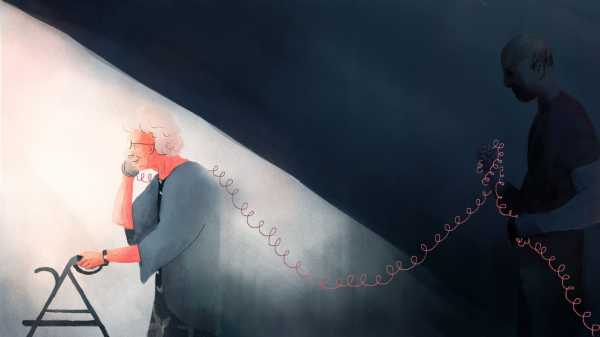
The voice mail was from my mother’s longtime stockbroker, in the private-client department at Charles Schwab. “We’ve had some requests for large cash withdrawals from her account,” she said, and asked me to call her back. “We’re afraid that maybe someone has gotten to her. She requested two hundred thousand out.” She’d taken the money from a trust that she inherited from her own mother; now, the broker said, she had requested even more money. “And, again, we just want to make sure that this is legit as to what’s going on.”
I called back immediately and told the person who took my call to stop everything. Then I called my mother, who is in her late eighties and lives alone, in Kansas City, in a retirement community near a shopping area called the Country Club Plaza. (People who aren’t from Kansas City laugh at that name, but the shopping area is almost a century old. There’s also a Country Club Christian Church.) She angrily said that she knew what she was doing, and told me to butt out. Eventually, under pressure, she explained that she’d won enough money to set up our family for life, and that, if I interfered, I would ruin everything.
Back on the phone to Schwab. Then to the local bank where my mother had a checking account. Then e-mails to my daughter’s husband and an old high-school friend (both lawyers). Then phone calls or e-mails to my siblings, the Kansas City Police Department, the F.B.I., my mother’s accountant, and various state and federal fraud-related agencies and departments. That evening, my sister Anne, who’s a psychologist and lives about an hour away from my mother, visited her in her apartment. At that point, my mother still believed that she’d won $3.7 million from Publishers Clearing House, and that she would ultimately be vindicated. So Anne had to argue with her about that while making copies of e-mails and other documents, and retrieving torn-up papers from the trash. She had to pull one of the documents from my mother’s hand. She also took my mother’s checkbooks and credit cards.

The New Yorker Recommends:
Our staff and contributors share their cultural enthusiasms.
The scammer had told my mother that she’d be receiving her millions just as soon as she paid some federal taxes and fees—not directly to the United States Treasury, of course, but to a couple of helpful people whose job is handling that sort of thing. The person she talked to on the phone said his name was Sam. The e-mails that he and his fellow-scammers sent my mom were as sloppy and ungrammatical as the ones you get from Nigeria; in a couple of them, even her own name is misspelled. But she fell for everything. On Sam’s instructions, she shipped four fifty-thousand-dollar checks overnight to an address in California. When I checked her transaction-history page on Schwab’s Web site, I could see three of the checks, which were made out to two names. (The fourth check had not, apparently, been cashable.) It was to one of those names—initials H. C.—that my mother had overnighted everything. H. C. had signed the back of his check and deposited it into an account at Golden 1 Credit Union. I assumed, at first, that the name must be a fake, but, when I searched for it on Google, I found a listing in a Dun & Bradstreet online business directory—and the address was the same one my mother had sent the checks to, in Rancho Cordova, California. There was even a phone number, which I was scared to try. I then plugged the address into Google Earth, and, in Street View, I was able to look into a messy garage: lawnmower; joint-compound bucket; sawhorse; washer and dryer. There was a pickup truck parked in the driveway, across from a portable basketball hoop. The truck was facing out, toward the street, as if ready to make a getaway.
Everyone’s first reaction is incredulity. How could even an elderly widow have believed something so obviously phony? Actually, though, my mother was no more gullible than other people, without whose coöperation the theft could not have occurred. Fooling my mother required several apparently experienced criminals working in concert, but fooling Schwab and her accountant required only her. My mother had a stroke in 2013. (She drove herself to the emergency room.) Now she was about to turn eighty-nine, and, suddenly, she was asking to make transactions that were radically different from any that she’d made before. Before I’d listened to half of the voice mail from the broker—before she had mentioned any sum of money—my stomach had tightened into a knot, and I knew for certain that my mother had been scammed. Why didn’t Schwab? And, if the broker was suspicious enough to call me before allowing my mother to make a second huge withdrawal, why not before allowing her to make the first? The senior-fraud page of the F.B.I.’s Web site says, “People who grew up in the 1930s, 1940s, and 1950s were generally raised to be polite and trusting.” But tottering oldsters aren’t the only vulnerable people in the world. How could trained financial professionals have believed the lies of someone who lies as badly as my mother does?
On a cops-and-robbers television show, discovering that H. C. was a real person with a real house and a real bank account wouldn’t have been as easy as it was for me—there would have been a hard drive buried in a landfill, or DNA on a soda straw, or a grainy photograph that could be deciphered only with a supercomputer—and finding him would have been a break in the case. Not so in real life. Four days after I filed an online report with the State of Missouri—which claims to be extremely interested in wiping out elder fraud—my mother received a letter from a paralegal in the office of the Secretary of State saying that an investigator had reviewed the matter and that “no further investigation will be conducted by this office.” The only law-enforcement person who called me was a detective in the economic-crimes section of the Kansas City Police Department. He said that the people who receive the money in cases like this are usually at least semi-unwitting participants, who pass the money to someone else, who wires it out of the country. He did say that it was unusual for paper checks to be involved, because scammers, for obvious reasons, prefer bank transfers. I interpreted this fact as a reason for mild optimism. But he didn’t let out a Sherlockian “Hello! What’s this?” when I told him I had a photograph of the inside of H. C.’s garage. He said that Anne should go to any police station in Kansas City and make a report. “And tell her not to leave without a case number.”
At the police station, Anne had trouble getting anyone to pay attention to her. She eventually did speak with an officer, in a cavernous lobby with echoing acoustics. The officer sat at a long table on the other side of a thick glass partition, which, Anne told me later, in an e-mail, “had four places to speak into a little round metal louvered hole (about six inches too high) and four little scooped-out slots like where they slide you your cigarettes at the after-hours gas station.” Through that slot, she gave the officer a copy of a form I’d filed on the Web site of the federal government’s Internet Crime Complaint Center, to which I’d been referred by an F.B.I. agent. She said the form contained all the information he needed. “He looked at it briefly, then slid it back to me, and said, ‘This is for another investigation.’ Then he pulled out a tiny spiral notebook, the kind you might make a shopping list in, and began slowly writing things down.” Anne had made a copy of the address label my mother took to the UPS store when she sent the checks to H. C., but he didn’t want to see it. “We’ll need to have all the originals, for evidence,” he said. When he had finished writing in his tiny notebook, he told her that another officer would contact her in a day or two. (She heard back a month later.)
When I picture my mother crossing that enormous lobby with her walker, then trying to speak through an opening she probably wouldn’t see, to an unsympathetic cop whom she would definitely have trouble hearing, I picture her crying. The same kind of technological bafflement that makes these crimes possible in the first place also makes them virtually impossible for their victims to report. The online forms are confusing. The choices in the drop-down lists don’t seem to apply. Hardly anyone ever gets back to you. (Anxiously pacing while you wait for the phone to ring, Anne and I have learned, is a good way to pump up your daily step count.) The F.B.I.’s Web site says, “When an elderly victim does report the crime, they often make poor witnesses. Con artists know the effects of age on memory, and they are counting on elderly victims not being able to supply enough detailed information to investigators.” You can see why criminals go into this line of work.
As soon as we learned of the fraud, Anne froze my mother’s checking account, which the two of them owned jointly. We knew that my mother had moved fifty thousand dollars into that account from Schwab at around the time she made the other transactions, presumably on further instructions from Sam. But now that money was safe.
Or so we thought. Immediately after Anne had visited our mother’s apartment and taken away her checkbooks, our mother called not me or my brother or any of her friends but Sam. The next day, on instructions from him, she drove to a different bank branch from the one she ordinarily used and persuaded someone there to allow her to “fax” the money. (“Fax” was the word she used when she confessed to Anne and me, so I assume she used it at the bank, too.) She told me later that she’d done it because Sam had told her he was in jail and needed the money to get out. The banker who took her wire order asked her what the money was for, and she answered, as Sam had told her to, that it was a payment to a contractor who had done some work for some family who lived in San Antonio (not true). The banker asked why the contractor didn’t have a business name—why she was sending the money to an individual, not to a company. My mother said that this contractor was too small for that. The banker was suspicious enough to refer the request, after my mother had left, to a manager. The manager called my mother, and she confirmed that she wanted to send the money, and, later that day, the transfer went through.
That money my mother did get back, since Anne had frozen the account. The rest is a work in progress; my mother’s stockbroker told me that Schwab is trying to retrieve the hundred and fifty thousand dollars, but didn’t agree that she and her colleagues should have called me earlier. (The broker declined to comment. In a statement, Schwab said that the investigation was ongoing, that they were allowed to hold disbursements if they suspected exploitation, and that, as soon as they did suspect fraud, they “stopped further disbursements, alerted our client’s children, and referred the case to state authorities.”)
Restoring the local bank account involved more effort than I would have guessed, although it probably happened faster than it would have if the bank had been a huge national one, based in a different city. The bank’s general counsel thanked me for my patience and said that I would be amazed at how common such frauds are. He also said that criminal ingenuity is constantly evolving. In one scam, he said, someone approaches a bank customer in the parking lot, claims to be an F.B.I. agent, and asks for help in conducting a sting on a dishonest employee. He said that his customers sometimes receive fraudulent e-mails containing accurate personal information about themselves, which scammers have pieced together from online sources, including social media, or by breaking into people’s computers.
My mother signed up for her apartment because my father was ill and she was worried that she wouldn’t be able to take care of him in their house, into which they had downsized from the home my siblings and I grew up in. He died before the building containing her apartment was finished. She could have backed out then, but decided to go ahead. In a matter like that, you can only be too early or too late, and, all things considered, it’s better to be too early. She was still spry, so the move was a breeze. She made packing-paper templates of some of her favorite pieces of furniture, then arranged the templates on the floor of her new living room, to see which ones she’d be able to keep. Quite a few of her friends moved, too.
With my father, we were too late. He’d been a stockbroker before he retired, when he was younger than I am now. Then, for a number of years, he was a more than able manager of his and my mother’s money. At some point, though, he slipped. His investment adviser allowed him to “diversify” his holdings by moving money out of some overpriced technology stocks and into mutual funds that were made up entirely of the same stocks. He had major surgery, from which he never entirely recovered; then, in 2001, the dot-com bubble burst, and his portfolio was hammered. My mother, my siblings, and I were afraid to intervene, because he’d always seemed so competent, but, in the end, we had surprisingly little trouble persuading him to step aside. I asked him what he would say if I told him I had an older friend who had just enough money for him and his wife to live on for the rest of their lives, and that my friend would like for my father to manage that money for them. He said, “I’d say you were crazy.” I said, “Well, that friend is you, and I think you’re right.” He laughed, and that was pretty much that.
With my mother and her life savings, we were obviously too late. Her stroke, five years ago, seemed catastrophic at the time, but then she made rapid progress. One of the stroke’s most interesting effects, which has never gone away, is that she often leaves the endings off words, both written and spoken. She also has a problem with numbers, and with decimal places. (Several times, she has described the sums she sent to California and Texas as “five-oh-oh-oh-oh,” and she once told me that her winnings from Publishers Clearing House were three hundred million dollars.) Mostly, though, she adapted; all by herself, she figured out how to use Google to check her arithmetic, and she’s always been extremely good at organizing financial records. My siblings and I assumed that, if she became incapable of handling her money, the change would be gradual, and that intervening before things got out of hand would be easy. One of the reasons we felt that way is that her broker, her accountant, and her banker knew her well and seemed to be looking out for her. But it all happened very fast. My mother herself has said that the person she was when she was dealing with Sam now seems to her like someone else.
The senior facility where she lives was bought recently by a big hospital just up the street. (That’s where she drove herself after her stroke.) I’ve spoken a couple of times with a social worker who sees clients in both places. She visited my mother two days after we’d discovered the fraud, and, among other things, encouraged her to eat, even though at that point my mother felt so devastated by what she had done that she wasn’t sure she even wanted to live. “Your mom said that she and the man who stole her money had become friends,” the social worker said. “She said she stayed home waiting for his phone call—which is exactly what another resident here did. That one was exactly the same story, including the lottery.” She continued, “I feel these people are preying on loneliness, because the other person said the same thing your mom did: ‘But they’re my friends; they’re who I talk to.’ ”
I have piles of old photographs of my parents and their pals yukking it up at beach parties, poker games, football games, cocktail parties, picnics, a ski trip. Of the people in those photographs, my mother is usually the only one who’s alive now. Quite a few people who lived on the street I grew up on lived where my mother does; she’s the last survivor. She had a serious boyfriend in her building for five or six years. They ate dinner together and went to concerts, and one year he took her to the Aspen Music Festival. He died in 2015. For a while, one of my mother’s regular social activities was going to the funerals of old friends, but now, as the herd has thinned, there are even fewer of those. When Anne went to confiscate the checkbooks and credit cards, she had to wait for her to return from visiting a longtime friend who recently moved to the assisted-living wing.
So I can see how it happens. As you get older, your news is only bad. Your friends die, your knees hurt more, your ears stop working, the tests show nothing, your children become impatient. Then, out of the blue, you hear from someone who has wonderful news. He has all the time in the world. He speaks slowly. He’s amazed that you’d like to do such a generous thing for your children and grandchildren and great-grandchildren. He says you sound so nice that he’d like to visit you in Kansas City someday. The main reason my mom trusted him, she told me later, was that he kept calling her, for more than a week: Why would someone be willing to spend that much time with her if he wasn’t for real? And she was doubly susceptible, I suspect, because she has never stopped regretting that we didn’t do something about my father a couple of years sooner. Here, finally, was a chance to make up for that.
The threats, I now understand, are everywhere. I play bridge with a woman who’s exactly my mother’s age. For years, I’ve urged her to get a computer, so that she’ll be able to play online if she ever ends up in a nursing home. She never has, and I used to think that was crazy. (Her son bought her a couple of Google Home devices; she uses one to hold down papers on top of her refrigerator.) The elderly are the only people who still answer their phone whenever it rings, the only people who still feel hopeful when they open their mailbox. Anne mentioned my mother’s predicament at her book club, and two of the other women said their parents had been scammed in the same way. There are no reliable statistics about how common elder fraud is, and one reason is that victims and their families are often ashamed to report it. Another is that the perpetrator is very often a member of the family. We’re pretty sure that the initial contact between the scammers and my mother was not over the Internet but through her mailbox, which almost every day contains at least one official-looking invitation to enter a sweepstakes by making a small donation to a worthy cause; her fiasco began with a handful of well-intentioned five-dollar checks. A researcher from this magazine actually tracked down and spoke with H. C., the person my mother sent her checks to. He turns out to be an elderly man who was probably tricked by the same scammers, and thought he was taking part in something to do with Publishers Clearing House.
My daughter and her kids were visiting my wife and me as all of this was unfolding. I told her that she and her husband should view it as a warning, and to watch us closely as we get older. “You’d never do anything like that,” she said. I was flattered, of course. But if I got a call tomorrow from a sympathetic-sounding man who said he was an investigator in the elder-fraud division of the attorney general’s office, and that my mother’s case was different from all those other cases, and that he was certain she’d get her hundred and fifty grand back—well, I wouldn’t send him a check, I’m pretty sure. But I would definitely believe him.
Sourse: newyorker.com






